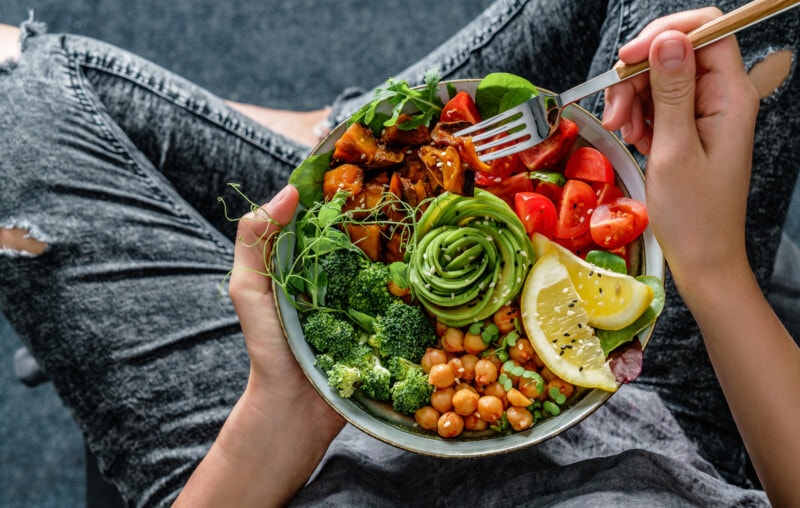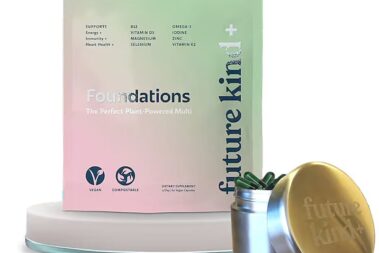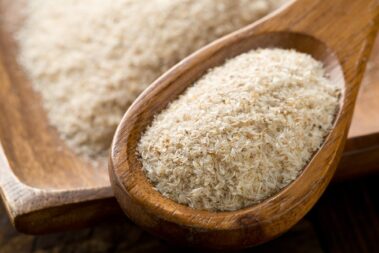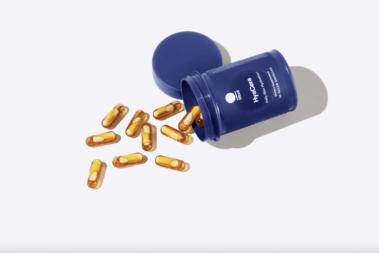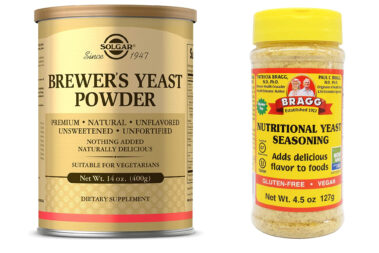Plant-based and vegan diets have been on an uptick for a while and continue to be popular. Many people are making the plant-forward switch for ethical or environmental reasons, while many others are eating vegan for their health. While there’s plenty of scientific evidence behind the health reasons to adopt a vegan or plant-based diet, you may be wondering whether it can lower cholesterol.
Let’s examine some of the basics of cholesterol and what the science says about vegan diets and cholesterol.
Table of Contents
What is Cholesterol?
Cholesterol is a waxy, fatty substance that can build up in your arteries and clog the flow of blood to and from your heart when in excess.
This doesn’t make cholesterol inherently bad. Your body (via your liver and intestines) actually produces its own cholesterol, as it’s needed to build cell membranes as well as produce fat-dissolving bile acids, vitamin D, and hormones like testosterone and estrogen.
In fact, only around 20% of the cholesterol in your blood is from your diet, with the rest coming from your body’s own production.
In order to move through your bloodstream, cholesterol has to be transported by something else. If it were moving through on its own, it would essentially look like floating globs that your body couldn’t actually use.
To make cholesterol transportable and useful, it’s packed in protein-covered particles that mix easily with blood, called lipoproteins. These lipoproteins come in a variety of forms, have unique tasks, and can morph into different forms.
Types of Cholesterol
Below are the 5 main types of particles that carry cholesterol and other fats throughout your blood.
- High-density lipoprotein (HDL): Often called “good” cholesterol, HDL works to remove cholesterol from your artery walls and circulation, taking it back to your liver to be excreted from your body.
- Low-density lipoprotein (LDL): Known best as “bad” cholesterol, LDL particles move cholesterol into your tissues and are associated with the accumulation of plaque in your arteries.
- Very-low-density lipoprotein (VLDL): These particles are produced by your liver and carry triglycerides (fatty acids from foods you eat) to your tissues. When fatty acids are removed from VLDLs by your cells, VLDLs morph first into intermediate-density lipoproteins and eventually LDL particles.
- Intermediate-density lipoproteins (IDL): As mentioned above, IDLs are created when fatty acids are extracted from VLDLs. Some of these are excreted via the liver while others become LDLs.
- Chylomicrons: These are very large particles made in your digestive system. They primarily carry triglycerides and are influenced by your diet.
What’s a Healthy Cholesterol Level?
Cholesterol levels are generally checked on an annual basis at wellness visits. However, they may also be checked more frequently if you have a personal or family history of heart disease or if your doctor is concerned about heart disease risk.
When you have your cholesterol checked, you’ll receive a whole panel of numbers, including HDL, LDL, and triglycerides. When LDL is high, this is a condition called hypercholesterolemia, which puts you at a higher risk for premature atherosclerotic heart disease. That’s why it’s so important to have your blood fat levels checked regularly.
The ideal cholesterol level is considered to be 200 mg/dL or lower, but a more detailed picture of optimal blood fats is outlined below.
Ideal fasting blood fat values include:
- Total Cholesterol: 200 mg/dL or lower
- HDL Cholesterol: 60 mg/dL or higher (above 40 mg/dL for men and 50 mg/dL for women is also considered good)
- LDL Cholesterol: 100 mg/dL or lower; below 70 mg/dL if you have diagnosed coronary artery disease
- Triglycerides: 100 mg/dL or lower
What the Research Says About Vegan Diets and Cholesterol
One of the biggest reasons why a whole foods-based vegan diet helps lower high cholesterol is because it replaces saturated fats found in animal products. Evidence shows that replacing saturated fat with unsaturated fats is associated with a lower risk for heart disease. Saturated fat consumption may be linked to higher LDL.
Here’s what some research in the last several years has found:
- A 2021 systematic review published in the Journal of Nutrition examined 7 studies involving 73,426 individuals, looking at risks of primary cardiovascular events among people who followed a vegan diet versus those who did not. The authors concluded that there is evidence that vegan diets can be associated with a lower risk for heart disease.
- A 2018 review published in PLoS One examined 40 observational studies between 1960 and 2018 to compare cardiometabolic risk factors and macronutrient intake among vegans and omnivores. They found that in most countries it’s fair to say that a vegan diet is associated with better cardiometabolic outcomes than an omnivorous diet. This included factors like BMI, LDL, triglycerides, and blood pressure.
- A 2017 meta-analysis published in Nutrition Reviews, including 30 observational studies and 19 clinical trials, concluded that plant-based diets are associated with lower total, LDL, and HDL cholesterol.
- A 2015 systematic review and meta-analysis published in the Journal of the American Heart Association concluded that plant-based diets are effective for reducing total and LDL cholesterol and that they should be considered a useful nonpharmaceutical means of managing high cholesterol.
In general, studies indicate that the positive heart health effects of adopting a plant-based diet are likely due to lower intakes of dietary cholesterol, saturated fat, and red and processed meat, combined with eating more fiber, plant-based protein, and phytonutrients.
Overall, more specific research is needed in this area. There can be significant differences in the nutritional value of a vegan diet depending on what types of foods someone eats and what other lifestyle factors are at play. But, the evidence is clear that a vegan diet ― especially one based on whole foods ― can be very good for heart health.
How to Lower Cholesterol on a Vegan Diet
The best way to lower high cholesterol levels on a vegan diet, and maintain them within a healthy range, is to focus on whole plant foods.
Adopting a vegan diet has never been easier with all of the meatless and dairy-free options today. However, this also means that the market for highly processed, packaged vegan foods (which may not be the healthiest choices) has grown substantially.
Whole plant foods are naturally free from cholesterol and contain little to no saturated fat. Plus, they’re high in fiber, which is known to help lower circulating blood fats. Some plant foods, like avocados, nuts, seeds, olives, and olive oil, are rich in unsaturated omega-3 fatty acids that also support heart health.
Foods to Eat
- Fruits: Apples, oranges, bananas, berries, peaches, pears, grapes, mango, pineapple, papaya, kiwi, tomatoes, avocados, etc.
- Vegetables: Carrots, potatoes, broccoli, beets, cauliflower, kale, spinach, collard greens, Swiss chard, onions, garlic, peppers, corn, olives, zucchini, squash, etc.
- Whole Grains: Brown rice, quinoa, amaranth, farro, barley, millet, whole-wheat pasta, oats, etc.
- Legumes: Green peas, lentils, beans, soy foods (tofu, tempeh) and peanuts
- Nuts: Cashews, pecans, macadamia, almonds, Brazil nuts, walnuts, etc.
- Seeds: Chia, hemp, flax, sunflower, sesame, pumpkin, etc.
These foods will provide a nice array of healthy unsaturated fats, plant-based protein, complex carbohydrates and fiber, vitamins, minerals, and antioxidants that help support heart health and overall wellness.
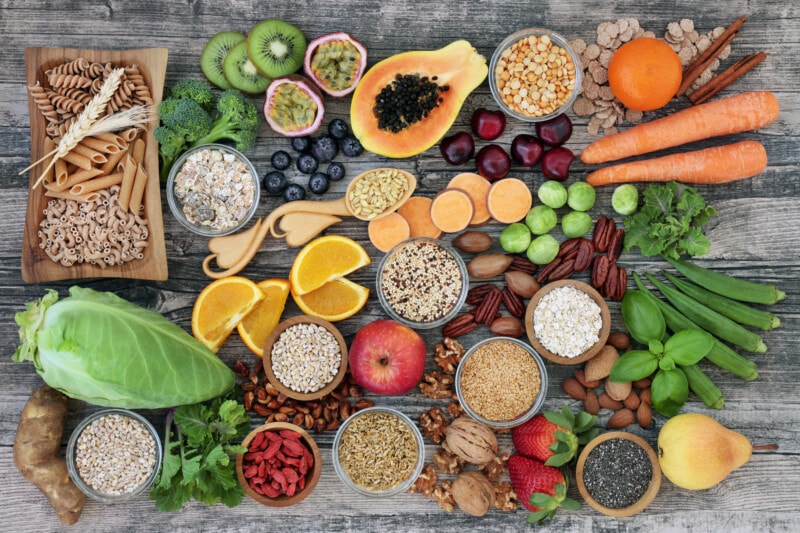
Foods to Avoid or Limit
- Ultra-processed snack foods, like chips, cookies, and crackers
- Processed meat substitutes (deli meats, hot dogs)
- Frozen, fast food, or convenience meals
- Pre-made sweets and packaged baked goods
- Sugar-sweetened beverages (soda, sweet tea, fruit juices, sports or energy drinks)
- Palm oil, coconut oil, and vegan butter
The items above may not contribute dietary cholesterol, but they can still work against your goals for keeping your blood fats within a healthy range. Studies suggest that eating ultra-processed foods may be linked to higher total and LDL cholesterol, as well as a higher risk for things like high blood pressure and metabolic syndrome.
Additionally, ultra-processed foods just don’t provide the same health benefits as whole plant foods when it comes to overall health goals and chronic disease risk management.
How Quickly Can a Vegan Diet Lower Cholesterol?
If you’re wondering how fast a vegan diet can lower cholesterol, it depends on the individual. However, once you start removing foods from your diet that promote high levels of blood fats and replace them with healthier whole plant foods, your body can get to work right away.
You may see changes in your cholesterol numbers within a matter of weeks depending on diet quality and how often your doctor is monitoring numbers.
Cholesterol can be pretty responsive to food intake, which is why many doctors recommend fasting for 8-12 hours before having bloodwork done if it includes a cholesterol panel.
Other Ways to Lower Cholesterol
In addition to prioritizing whole plant food choices, it’s important to practice other heart-healthy lifestyle habits as well.
For example, not smoking, having good stress management practices in place, reducing alcohol consumption, and engaging in regular physical activity.
You might also consider taking a vegan omega-3 supplement made from algal oil to help lower high cholesterol, though the evidence is mixed on the effectiveness of supplements.
Can a Vegan Diet Lower Cholesterol?
Switching to a vegan diet, which prioritizes whole plant foods and minimizes ultra-processed, sugar-sweetened, and packaged foods can help support normal cholesterol levels and promote heart health.
Choose a wide variety of plant foods that contribute fiber, vitamins, minerals, unsaturated omega-3 fats, protein, and antioxidants. Pair with regular exercise and other healthy lifestyle habits for the best results.
- 11 Best Vegan B12 Supplements for 2023 - June 16, 2023
- 6 Best Vegan Kids Vitamins of 2024 - May 23, 2023
- 5 Best Vegan Digestive Enzyme Supplements for 2023 - May 25, 2022

